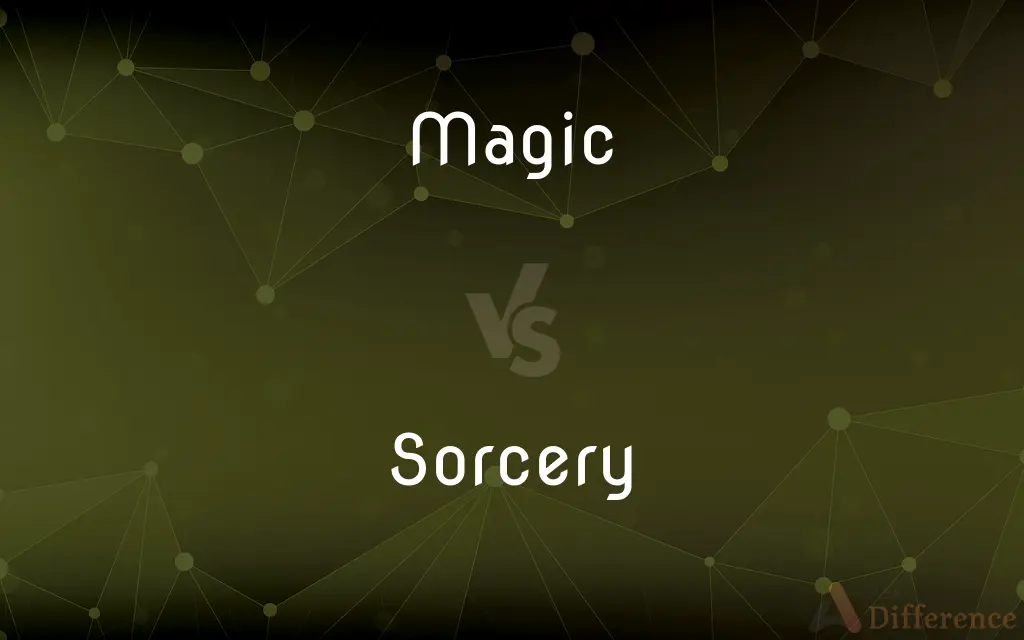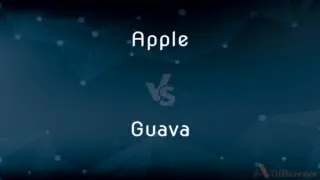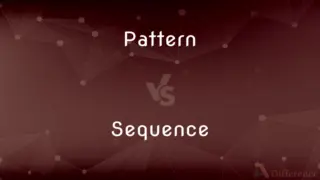Magic vs. Sorcery — What's the Difference?
By Tayyaba Rehman & Fiza Rafique — Updated on March 12, 2024
Magic is a broad term encompassing practices aimed at manipulating supernatural forces, while sorcery specifically refers to the use of spells or charms, often with a focus on darker, malevolent purposes.

Difference Between Magic and Sorcery
Table of Contents
ADVERTISEMENT
Key Differences
Magic represents a wide array of practices that involve the invocation or manipulation of supernatural forces to achieve various ends. It can be found in numerous cultures worldwide, with practices ranging from benign and protective rituals to those intended to harm or manipulate. Sorcery, on the other hand, is often seen as a subset of magic that specifically involves the casting of spells or the use of charms and potions to exert control over natural events, individuals, or situations.
Magic can be categorized into different types, such as ceremonial magic, which involves complex rituals and ceremonies, and folk magic, which incorporates simple charms and spells into everyday life. Magic is neutral, its moral alignment determined by the practitioner's intentions and the societal context in which it is practiced. Historically and in popular culture, sorcery has been associated with malevolent intentions and the harnessing of dark forces. It implies a more deliberate attempt to manipulate supernatural powers for specific, often selfish or harmful, outcomes. Sorcery is frequently depicted as requiring knowledge of esoteric arts, secret languages, and forbidden materials.
While magic can encompass benign practices like healing, divination, and protection, sorcery is typically characterized by its practitioners' aim to bend supernatural forces to their will, regardless of the consequences. This distinction is not universal, however, as the perception of sorcery and its moral implications can vary significantly across different cultures and historical periods. In some traditions, what one culture or era might call sorcery, another might see as a legitimate form of magic.
The tools and symbols associated with magic and sorcery can overlap but often reflect their differing focuses. Magic, in its broader sense, might use a wide range of tools from natural elements, symbolic objects, and personal items to facilitate connection with the supernatural. Sorcery, with its focus on spellcasting and manipulation, often employs specific items believed to possess power or symbolic significance, such as wands, grimoires (spell books), and talismans.
While all sorcery can be considered a form of magic, not all magic is sorcery. The key distinction lies in the intention behind the practice and the cultural or ethical framework that defines it. Magic's broad spectrum covers a range of practices that interact with the supernatural, while sorcery zeroes in on the manipulation of these forces, often with a darker connotation.
ADVERTISEMENT
Comparison Chart
Scope
Broad, encompasses various supernatural practices
Specific, focused on spellcasting and charms
Intentions
Neutral, depends on practitioner
Often malevolent or self-serving
Practices
Healing, divination, protection, etc.
Casting spells, using potions, and invoking spirits
Perception
Varied, can be positive or negative
Frequently associated with dark or harmful magic
Tools
Natural elements, symbols, personal items
Wands, grimoires, talismans, specific ingredients
Compare with Definitions
Magic
A broad term for supernatural practices.
Magic has been part of human culture across civilizations.
Sorcery
The practice of using spells and charms, often with dark aims.
Legends tell of sorcery used to summon demons.
Magic
The use of supernatural forces to influence events.
The villagers believed in magic to protect their crops.
Sorcery
The art of spellcasting and invoking supernatural powers.
Sorcery requires knowledge of ancient and secret arts.
Magic
The art of producing illusions through sleight of hand.
The magician's magic amazed the audience.
Sorcery
The use of magic, particularly for malevolent ends.
The witch used sorcery to curse her enemies.
Magic
The ability to control natural forces through supernatural means.
Magic was once considered a divine gift.
Sorcery
A term often associated with black magic and witchcraft.
Sorcery was feared in medieval times as a pact with the devil.
Magic
Practices involving rituals and spells for various purposes.
She studied magic to understand ancient healing techniques.
Sorcery
Manipulation of supernatural forces for specific purposes.
He was accused of sorcery for his inexplicable influence.
Magic
A conjuring trick or illusion performed to give the appearance of supernatural phenomena or powers.
Sorcery
The belief in magical spells that harness occult forces or evil spirits to produce unnatural effects in the world
Magic
The art or practice of performing conjuring tricks and illusions.
Sorcery
Use of supernatural power over others through the assistance of spirits; witchcraft.
Magic
The power of apparently influencing events by using mysterious or supernatural forces
Suddenly, as if by magic, the doors start to open
Sorcery
Magical power; the use of witchcraft or magic arts.
Magic
Having or apparently having supernatural powers
A magic wand
Sorcery
Divination by the assistance, or supposed assistance, of evil spirits, or the power of commanding evil spirits; magic; necromancy; witchcraft; enchantment.
Adder's wisdom I have learned,To fence my ear against thy sorceries.
Magic
Wonderful; exciting
It was a great time, magic
Magic
Move, change, or create by or as if by magic
He must have been magicked out of the car at the precise second it exploded
Magic
The art or practice of using charms, spells, or rituals to attempt to produce supernatural effects or control events in nature.
Magic
The charms, spells, and rituals so used.
Magic
The exercise of sleight of hand or conjuring, as in making something seem to disappear, for entertainment.
Magic
A mysterious quality of enchantment
"For me the names of those men breathed the magic of the past" (Max Beerbohm).
Magic
Of, relating to, or invoking the supernatural
"stubborn unlaid ghost / That breaks his magic chains at curfew time" (John Milton).
Magic
Possessing distinctive qualities that produce unaccountable or baffling effects.
Magic
To produce, alter, or cause by or as if by magic
"Intelligent warm-hearted Gertrude had magicked him into happiness" (Iris Murdoch).
Magic
To cause to disappear by or as if by magic. Used with away
His shoes had been magicked away in the night.
Magic
The application of rituals or actions, especially those based on occult knowledge, to subdue or manipulate natural or supernatural beings and forces in order to have some benefit from them.
Magic
A specific ritual or procedure associated with such magic; a spell.
Magic
The supernatural forces which are drawn on in such a ritual.
Magic
Something producing successful and remarkable results, especially when not fully understood; an enchanting quality; exceptional skill.
Magic
Complicated or esoteric code that is not expected to be generally understood.
Magic
Having supernatural talents, properties or qualities attributed to magic.
A magic wand
A magic dragon
Magic
Producing extraordinary results, as though through the use of magic.
A magic moment
Magic
Pertaining to conjuring tricks or illusions performed for entertainment etc.
A magic show
A magic trick
Magic
(colloquial) Great; excellent.
I cleaned up the flat while you were out. —Really? Magic!
Magic
(physics) Describing the number of nucleons in a particularly stable isotopic nucleus; 2, 8, 20, 28, 50, 82, 126, and 184.
Magic
(programming) Being a literal number or string value with no meaning or context, not defined as a constant or variable
The code is full of magic numbers and we can't figure out what they mean.
Magic
(transitive) To produce, transform (something), (as if) by magic.
Magic
A comprehensive name for all of the pretended arts which claim to produce effects by the assistance of supernatural beings, or departed spirits, or by a mastery of secret forces in nature attained by a study of occult science, including enchantment, conjuration, witchcraft, sorcery, necromancy, incantation, etc.
An appearance made by some magic.
Magic
The art of creating illusions which appear to the observer to be inexplicable except by some supernatural influence; it includes simple sleight of hand (legerdemain) as well as more elaborate stage magic, using special devices constructed to produce mystifying effects; as, the magic of David Copperfield. It is practised as an entertainment, by magicians who do not pretend to have supernatural powers.
Magic
Pertaining to the hidden wisdom supposed to be possessed by the Magi; relating to the occult powers of nature, and the producing of effects by their agency.
Magic
Performed by, or proceeding from, occult and superhuman agencies; done by, or seemingly done by, enchantment or sorcery; as, a magical spell.
The painter's magic skill.
Magic
Any art that invokes supernatural powers
Magic
An illusory feat; considered magical by naive observers
Magic
Possessing or using or characteristic of or appropriate to supernatural powers;
Charming incantations
Magic signs that protect against adverse influence
A magical spell
'tis now the very witching time of night
Wizard wands
Wizardly powers
Common Curiosities
Are magic and sorcery real?
Beliefs in magic and sorcery have been part of human cultures worldwide, though their existence and effects are matters of faith and personal belief.
What are common tools in sorcery?
Tools can include grimoires, wands, talismans, and specific ingredients for spells and potions.
Can magic or sorcery affect the physical world?
Believers assert that these practices can influence the physical world, though such effects are subject to personal belief and cultural interpretation.
Can sorcery be used for good?
While typically associated with darker purposes, the moral alignment of sorcery can vary by cultural perception and intention.
Is there a scientific basis for magic or sorcery?
Mainstream science does not support the existence of supernatural forces, viewing magic and sorcery as part of cultural or psychological phenomena.
What role does intention play in magic and sorcery?
Intention is crucial; it determines whether a practice is considered benign or malevolent, influencing the categorization of the action as magic or sorcery.
How is sorcery depicted in popular culture?
In films, books, and TV, sorcery is often portrayed as a dark art involving spellcasting, enchantments, and dealings with supernatural entities.
How do practitioners learn magic or sorcery?
Traditionally, knowledge is passed down through apprenticeships, secret societies, or texts that teach the mystical arts.
Has the perception of magic and sorcery changed over time?
Yes, societal and cultural changes have shifted how magic and sorcery are viewed, from feared practices to subjects of fascination or entertainment.
What is the main difference between magic and sorcery?
Magic is a neutral, broad term for supernatural practices, while sorcery specifically involves spellcasting, often with malevolent intentions.
Why is sorcery often viewed negatively?
Sorcery's association with malevolent forces and the manipulation of others for personal gain contribute to its negative perception.
Can magic be part of religious or spiritual practices?
Yes, many religions and spiritual paths incorporate forms of magic as part of their rituals and beliefs.
What distinguishes a magician from a sorcerer?
A magician might engage in a broader range of magical practices, while a sorcerer specifically focuses on spellcasting and charms, often with a darker intent.
What is the role of belief in the effectiveness of magic and sorcery?
Belief plays a crucial role; the efficacy of magical or sorcerous practices is often tied to the strength of belief in their power and the rituals themselves.
Are there modern practitioners of magic and sorcery?
Yes, individuals and groups continue to practice various forms of magic and sorcery, often as part of broader spiritual or cultural traditions.
Share Your Discovery

Previous Comparison
Apple vs. Guava
Next Comparison
Pattern vs. SequenceAuthor Spotlight
Written by
Tayyaba RehmanTayyaba Rehman is a distinguished writer, currently serving as a primary contributor to askdifference.com. As a researcher in semantics and etymology, Tayyaba's passion for the complexity of languages and their distinctions has found a perfect home on the platform. Tayyaba delves into the intricacies of language, distinguishing between commonly confused words and phrases, thereby providing clarity for readers worldwide.
Co-written by
Fiza RafiqueFiza Rafique is a skilled content writer at AskDifference.com, where she meticulously refines and enhances written pieces. Drawing from her vast editorial expertise, Fiza ensures clarity, accuracy, and precision in every article. Passionate about language, she continually seeks to elevate the quality of content for readers worldwide.














































